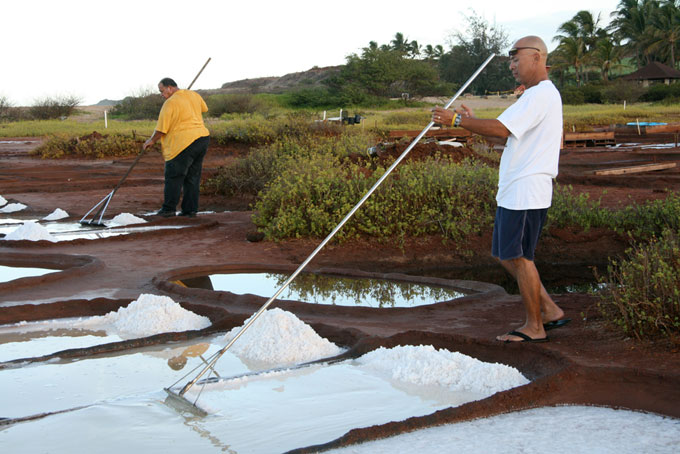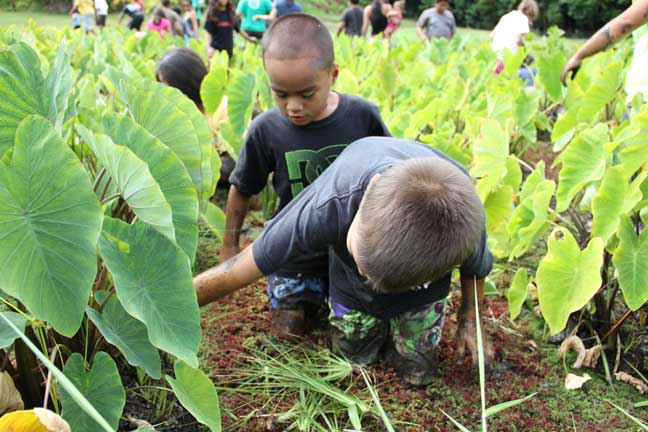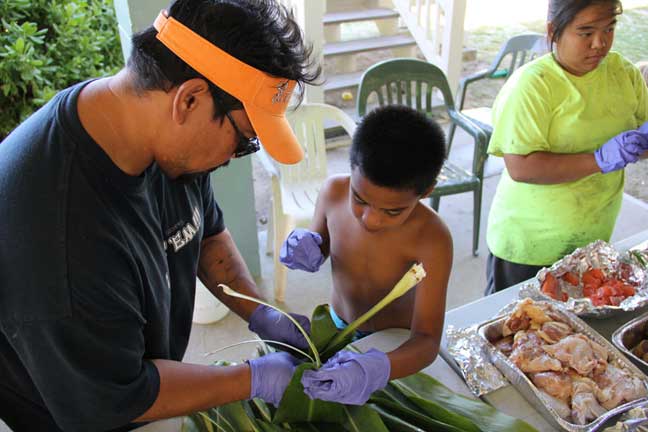Strengthens Hawai‘i’s Food Security and Builds Partnerships to Protect Environment and Native Hawaiian Cultural Knowledge
HONOLULU - The Detroit-based Kresge Foundation has awarded $460,000 to Lamakū Na‘auao (Knowledge Torch), a new University of Hawai‘i at Mānoa program that will build the capacity of the Native Hawaiian community to participate in decision-making in critical environmental and social issues.
Participants in the Lamakū Na‘auao project will receive training and policy tools designed to help them contribute to decisions involving island food security, renewable energy research, cultural practices, and the impacts of climate change.

The project is spearheaded by Loli Aniau, Maka‘ala Aniau (LAMA), a new program housed within the Hawai'inuiākea School of Hawaiian Knowledge and the William S. Richardson School of Law.
The core idea is that the Hawaiian community has a deep reservoir of knowledge that can benefit not only its own members but also the larger community.
The “Lamakū Na‘auao” project builds on the partnership between the Kresge Foundation and the Center for Island Climate Adaptation and Policy (ICAP), which gathered information about climate change adaptation strategies and practices that would be beneficial for the Native Hawaiian community and the State of Hawai‘i.
Funding from the Kresge Foundation will help LAMA:
- Hire qualified staff.
- Develop the Kilo Honua (earth observers) curriculum and distribute it to Native Hawaiian communities and the general public through workshops. The workshops will offer a human rights-based approach to enhancing food security, renewable energy development, and traditional knowledge from a local, national, and Pacific perspective.
- Design and publish a briefing sheet that evaluates existing laws and policies around traditional knowledge relevant to Hawai‘i and then offers effective recommendations that recognize the rights of Native Hawaiians to their traditional knowledge, cultural expressions, and art forms as well as natural and biological resources.
- Create a website and via community television and social media provide the Native Hawaiian and Hawai‘i communities with information to inform dialogue with local, state, and national policy-makers about climate change, renewable energy, food security, and traditional knowledge.
“The Lamakū Na‘auao (Knowledge Torch) project aligns well with Hawai‘inuiākea’s mission which is to pursue, perpetuate, research, and revitalize all areas and forms of Hawaiian knowledge and apply this knowledge to provide service and support to the Hawaiian community and beyond.”
Maenette K.P. Ah Nee Benham
Dean of the Hawai‘inuiākea School of Hawaiian Knowledge
William S. Richardson Law School Dean Avi Soifer said the new program is a perfect fit for the Law School’s focus on environmental law and sustainability issues. “Our Environmental Law Program (ELP) focuses on training environmental lawyers who contribute to the advancement of environmental law in multiple ways and they practice locally, regionally, nationally, and internationally,” said Soifer. “Partnering with LAMA is certain to enhance that mission.”


Preserving Native Hawaiian cultural knowledge.
Director of Strategic Partnerships for LAMA, Climate Change and Climate Alert, Malia Nobrega-Olivera noted how critical this effort will be in creating a cohesive effort and community awareness, especially around critical climate change issues. “It will enhance current partnerships and expand LAMA’s reach to new collaborators to create and implement innovative models of climate resiliency for the Islands,” she said.
Donna Vuchinich, president and CEO of the University of Hawai‘i Foundation concluded, “We are delighted that this premiere national foundation is building on their past support and fueling this important effort that will benefit our entire island community.”
To learn how you can support the William S. Richardson School of Law, please visit www.uhfoundation.org/GiveToWSRSL.
For information on how to support the Hawai'inuiākea School of Hawaiian Knowledge, please visit www.uhfoundation.org/GiveToHawaiianKnowledge.
# # #
The University of Hawai‘i Foundation, a nonprofit organization, raises private funds to support the University of Hawai‘i System. The mission of the University of Hawai‘i Foundation is to unite donors’ passions with the University of Hawai‘i’s aspirations by raising philanthropic support and managing private investments to benefit UH, the people of Hawai‘i and our future generations. www.uhfoundation.org
Loli Aniau, Maka‘ala Aniau’s (LAMA) mission is to catalyze climate adaptation and resiliency by engaging communities in Hawai’i and beyond through innovative training and policy tools that link decision-makers with the university, island communities, and the public as well as private sectors. http://islandclimate.net
The Kresge Foundation is a $3 billion private, national foundation that seeks to influence the quality of life for future generations through its support of nonprofit organizations working in its seven program areas: Arts and Culture, Community Development, Detroit, Education, the Environment, Health, and Human Services In 2012, the Board of Trustees approved 410 awards totaling $130.5 million; $150.3 million was paid out to grantees over the course of the year. For more information, visit kresge.org.